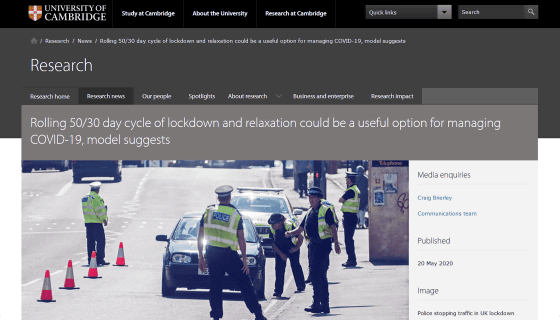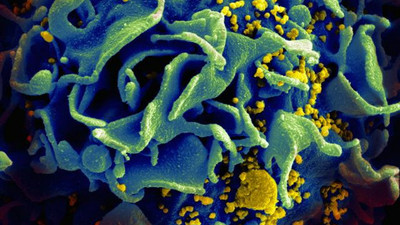Research results that it is possible to suppress the epidemic of new coronavirus infection by repeating '50-day city blockade and 30-day restriction relaxation'

In order to suppress the epidemic of the new coronavirus infectious disease (COVID-19), countries around the world are implementing a strategy of keeping social distance, but continuing severe strict urban blockade for months will cause serious damage to the economy There is also concern that it may be. Therefore, an international research team consisting of researchers from the United Kingdom, Australia, the United States, etc. said that it is possible to control the pandemic of COVID-19 by repeating '50 days of city blockade and 30 days of relaxation'. Announced.
Dynamic interventions to control COVID-19 pandemic: a multivariate prediction modeling study comparing 16 worldwide countries | SpringerLink
Rolling 50/30 day cycle of lockdown and relaxation could be a useful option for managing COVID-19, model suggests | University of Cambridge
https://www.cam.ac.uk/research/news/rolling-5030-day-cycle-of-lockdown-and-relaxation-could-be-a-useful-option-for-managing-covid-19

50 days in lockdown, 30 days of relaxation, could help contain COVID-19 pandemic | Live Science
New Coronavirus Infection (COVID-19) is raging around the world, with more than 4.94 million infected and more than 320,000 dead as of May 21, 2020. The COVID-19 pandemic is an unprecedented challenge for healthcare systems, societies, and governments around the world, and there are no effective and standardized treatments or vaccines at the time of writing.
Under such circumstances, each country is focusing on measures to 'minimize the number of cases of new coronavirus transmission from person to person by maintaining social distance.' While such measures are important to delay the spread of disease and prevent the collapse of medical care, it has been pointed out that strict urban blockades can lead to unemployment, economic stagnation, and social turmoil.
In countries such as the United States, it has been reported that residents who claim that 'a strong urban blockade violates human rights' are holding a series of protests against going out restrictions.
Facebook is implementing measures to delete the event page of the protest demonstration while protest demonstrations against going out restrictions are being held in the United States one after another-GIGAZINE

Residents' mental health and financial problems have made it increasingly difficult to continue the city blockade for several months, and a new approach is to 'impose restrictions on social distance and reduce restrictions. The method of 'replacing the periods alternately' is also drawing attention. Therefore, the research team, which accounts for a quarter of the world's population and is geographically and incomeally diverse, the Netherlands, Belgium, Chile, Colombia, Mexico, South Africa, Nigeria, Ethiopia, Tanzania, Uganda, India, and Bangladesh. • Developed a model for 16 countries-Pakistan, Sri Lanka, Yemen and Australia-simulating multiple scenarios of enforcement and mitigation of behavior restrictions.
The first scenario is that 'no action restrictions are imposed'. In this case, the number of patients requiring intensive care unit (ICU) treatment quickly exceeded the limit, resulting in a total of approximately 7.8 million deaths in 16 countries. The epidemic of COVID-19 lasted about 200 days in almost all countries.
The second scenario was to repeat '50 days of loose action restriction' and '30 days of restriction removal'. 'Mild action restrictions' mean maintaining a general social distance strategy, protecting groups vulnerable to COVID-19, taking measures such as school closures and bans of large-scale events. , Individuals are only allowed to go out. In this scenario, although the “ basic reproduction number (R0) ”, which is a measure of how much an infectious disease patient spreads the infectious disease, dropped to 0.8, the number of patients entering the ICU is limited to about 3 months. The result was a total of 3.5 million deaths in 16 countries. The pandemic lasted about 12 months in high-income countries and about 18 months in middle- and low-income countries.
The third scenario that the research team tried was to repeat '50 days of city blockade' and '30 days of restriction removal'. The blockade of the city basically prohibits residents from going out and allows them to go out only when it is absolutely necessary for their daily life, such as the purchase of daily necessities. When simulating this scenario, R0 dropped to 0.5 and the death toll in 16 countries was around 130,000. On the other hand, because the number of people infected with the new coronavirus has decreased, few people have acquired antibodies, resulting in a pandemic itself that lasts over 18 months in all countries.

'Our study offers strategic options that countries can use to control COVID-19 and delay the peak of infection,' said Oscar Franco of the University of Bern, who co-authored the paper. It should allow countries to gain valuable time to strengthen their healthcare systems and increase their efforts to develop new treatments and vaccines. There is no easy answer to the question of which strategy to choose. ' He pointed out that low-income countries are facing the dilemma of COVID-19 mortality, medical collapse, and long-term economic collapse.

Related Posts:
in Science, Posted by log1h_ik







